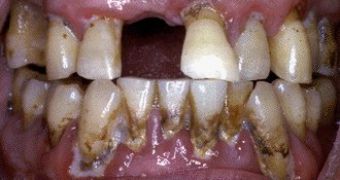You may induce a heart attack on those around you by displaying blackened and fouling teeth, but because of them you could also have a heart attack. A medical team in Marseille has discovered that those with the worst blockages in their arteries also displayed the most severe gum disease.
Gum disease was known as an important factor for heart disease, but the new research is the first to reveal that the severity of a disease is interconnected with the other.
Chronic gum disease (periodontitis) installs when waste material or plaque gather around the teeth's base and infects the gums. Plaque will not install when teeth are taken care of properly. But wrong brush and floss can lead to irritated gums vulnerable to infection; the base of the teeth is weakened and they eventually fall out. It is believed that the bacteria from the infected gums are the factor determining heart problems.
In the bloodstream, the germs activate the immune system, turning artery walls inflamed and narrowed, or bind directly to fatty deposits already built in the arteries, a fact that causes further narrowing.
The French team investigated 131 patients, who underwent an X-ray examination of the arteries, gum disease examination and blood check for inflammation.
"Patients with artery disease had more severe periodontitis than those without. The most severe teeth disease was associated with the most widespread arterial lesions," said lead researcher Dr Nicolas Amabile.
"We are the first to report that the severity of periodontitis is linked to the extension of coronary arterial lesions. Gum disease could be used as a new risk factor to identify those likely to develop heart disease. Since periodontitis is easily accessible to treatment with antibiotics and dental care, one might think its treatment could also be beneficial for coronary artery disease. This has to be confirmed with larger studies but may represent a new original approach to handle heart disease in the future." he said.
"The link between gum disease and heart disease was not yet proven. It is not clear whether established risk factors for heart disease such as smoking and diabetes have been taken into account." said Professor Robin Seymour, of Newcastle University Dental School.
But researches made by his team and in Australia revealed patients with advanced gum disease who had all their teeth replaced presented a drop in a blood protein linked to heart disease.
"They have only been followed for six months and we don't know whether it will produce any longterm reduction in heart disease. It's good practice to get your teeth checked regularly. You may not even be aware you have gum disease but it's both preventable and treatable." said Seymour.

 14 DAY TRIAL //
14 DAY TRIAL //